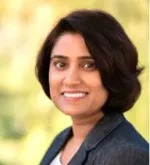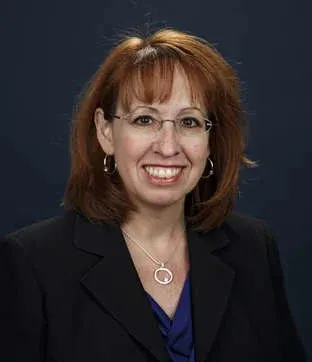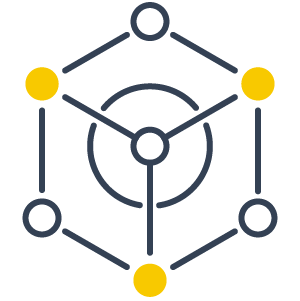- Go to Section
- Admissions Requirements
- Curriculum
- Faculty
- Career Outcomes
- Dissertation
- FAQs
Student Spotlight: Jennifer Malue Bartone

"This program has empowered me and helped me to realize that my voice matters and that I have a unique perspective that needs to be shared."
About Marymount's Online Ed.D. in Educational Leadership and Organizational Innovation
Whether you want to make a difference in your organization or community, an online Ed.D. in Educational Leadership and Organizational Innovation will empower you as a change agent ready to initiate and inspire.
Aligned with best practices and insights from influential thought leaders, this terminal degree from Marymount University equips you to drive positive change and greater outcomes in schools, communities, government, healthcare, and public and private organizations.
-
All applicants must have completed a master’s degree from a regionally accredited institution with a minimum 2.75 GPA and submit:
- Official transcripts
- Two professional references
- Professional essay
- Current resume with 3+ years of relevant experience
- Virtual interview with a faculty member
-
-
-
All applicants must have completed a master’s degree from a regionally accredited institution with a minimum 2.75 GPA and submit:
- Official transcripts
- Two professional references
- Professional essay
- Current resume with 3+ years of relevant experience
- Virtual interview with a faculty member
Student Spotlight

"I was able to work with a co-worker, who is also in the Ed.D. program, on several assignments that were immediately put into practice."

"I plan to launch my leadership methodology called SPY2, a model for future leaders to use as they bring change within their organizations."

"I started The Learning Box International, a virtual after-school program for children. It was magical watching children learn and share experiences."
Online Ed.D. Program Curriculum Snapshot
For a complete list of courses and course descriptions, access your comprehensive Doctor of Education program guide.
This course provides an overview of the theoretical framework for the practice of leadership in organizations leading to the application of theory and best practices in your educational leadership practice. We will also focus on specific leadership topics such as strategic leadership, systems thinking, team leadership, change management and developing others. We will move back and forth between theory and practice and include opportunities for self-reflection and skill development. (3 credits)
A focus on issues and practical applications of ethical principles of leadership, which includes a review of philosophical foundations as context for consideration of ethical issues and dilemmas. Towards this end, this course will evaluate the concept of justice in organizations, and the changing demographics of our society, especially related to race and culture, gender, age, disability and socio-economic status. Emphasis will be placed on effective organizational management of diversity for social justice outcomes. (3 credits)
The ability to transform and adapt as leaders to meet the demand of an ever-changing working environment is crucial. Continual growth and personal development are imperative for leaders to be successful in our complex global economy. This course facilitates the development of self, organization and community through enactment of adult learning theory as it relates to transformational leadership values. The scope of study includes analysis of transformational leadership theory and the development and implementation of leadership and change projects. (3 credits)
This writing intensive course covers the foundations of enacting leadership content gained thus far for the purpose of locating, developing, analyzing, synthesizing and constructing a sound literature review consistent with the research on the student’s chosen research topic. The purpose of this course is to provide an introduction to the practice of research and research design. This course provides students with opportunities to develop skills that are essential for conducting research and completing a research project with a particular focus on reviewing literature and composing a literature review paper. Students will demonstrate the ability to differentiate among alternative research viewpoints, differentiate constituent parts of the review, assess and comment on theories, thoughts, and ideas, concept proposals and relevant literature, and construct a cogent and compelling literature review. (3 credits)
Next Application Deadline:
Our next term is starting soon. Don't miss out! Complete the form to view application requirements and upcoming deadlines.
A National Leader in Education
Influential. Historically Significant. Diverse. Located just six miles from the nation’s capital, Marymount University is positioned for you to make a lasting impact.
School of Education Faculty

Dr. Paula Cristina Azevedo
Assistant Professor
Dr. Azevedo is experienced in teaching, advising, research and mindfulness.
Read more
Dr. Ruth Boyd
Visiting Professor
Dr. Boyd has 30+ years of teaching experience and has held multiple supervisory roles.
Read more
Dr. Jennifer Crystle
Assistant Professor
Dr. Crystle’s interests are global education policy, diversity, leadership and more.
Read more
Dr. Clara Hauth
Program Director and Associate Professor
Dr. Hauth is experienced in special education, graduate instruction, teacher training and more.
Read more
Dr. Jessica Marotta
Associate Professor
Dr. Marotta’s research interests are leadership, assessment and preservice teacher education.
Read more
Dr. Shannon Melideo
Professor
Dr. Melideo is experienced in mentorship, research, administration, education and more.
Read moreWhat Can You Do With a Doctorate of Education
An Ed.D. in Educational Leadership & Organizational Innovation can be applied to various industries. Here are some of the leadership positions that our students pursued and are pursuing through our doctoral program.
- School Principal
- School Superintendent
- Business Owner
- Nonprofit Leader
- Leadership Coach
- Instructional Coach
- Training and Development Manager
- Special Education
- Policy Maker
- Consulting
- Educational Technology & Policy
- Curriculum Specialist
"I have never felt so included in a community of scholarship. All the faculty support you — from the very first course to the final dissertation."
Chris Valadez, Online Ed.D. Student
Discover Why Our Dissertation is Different
Faculty mentors who care and built-in program support are just the beginning. Unlike a traditional dissertation, Marymount Ed.D. students complete a dissertation in practice (DiP) that emphasizes applying research and theory to solve a problem of practice facing your organization or community. Click the button below to access your program brochure and learn how our dissertation and high-impact community transform leaders to make a lasting change.
Frequently Asked Questions
A Doctor of Education or Ed.D. is a terminal degree that connects academia with real-world situations. Ed.D. coursework prepares professionals to lead change across diverse settings by building a deeper understanding of teaching and learning.
An online Ed.D. in Educational Leadership and Organizational Innovation equips professionals to achieve greater outcomes in schools, communities, government, healthcare, and public and private organizations. Possible leadership roles could include:
- Chief Learning Officer
- Curriculum Director
- Policy Maker
- School Superintendent
- Training and Development Manager
This part-time program is 100% online and requires 48 credit hours to graduate. It is possible to complete this degree in less than three years.
The online Ed.D. in Educational Leadership and Organizational Innovation program costs $1,444 per credit hour.
Financial Aid is available to those who qualify. You are solely responsible to research and complete all required steps, forms and applications.
Funding can come from the federal government or private sources, such as banks or financial institutions. We encourage you to research other sources of funding such as military and veteran benefits or scholarships from organizations. Learn more about available financial aid options on our Tuition and Financial Aid page.
Marymount’s online Ed.D. includes a dissertation designed to identify a relevant issue impacting your organization for the purpose of creating innovative solutions through research, theory and practice. Early in the program, you will be paired with a faculty advisor who will support and guide you through the Dissertation in Practice process. Click Here to learn more about the dissertation process.
Both terminal degrees that offer ample opportunities for leadership, learning and research. The main difference between an Ed.D. and a Ph.D. is in professional pursuits after graduation. An Ed.D. has practical applications that may go outside of academia. A Ph.D. has a more scholarly concentration which, more often than not, culminates in research-based studies.
There is no GRE/GMAT required. To apply, you must complete an interview with a member of the program faculty and submit the following:
- Transcripts with a minimum GPA of 2.75
- Two letters of recommendation
- A personal essay















